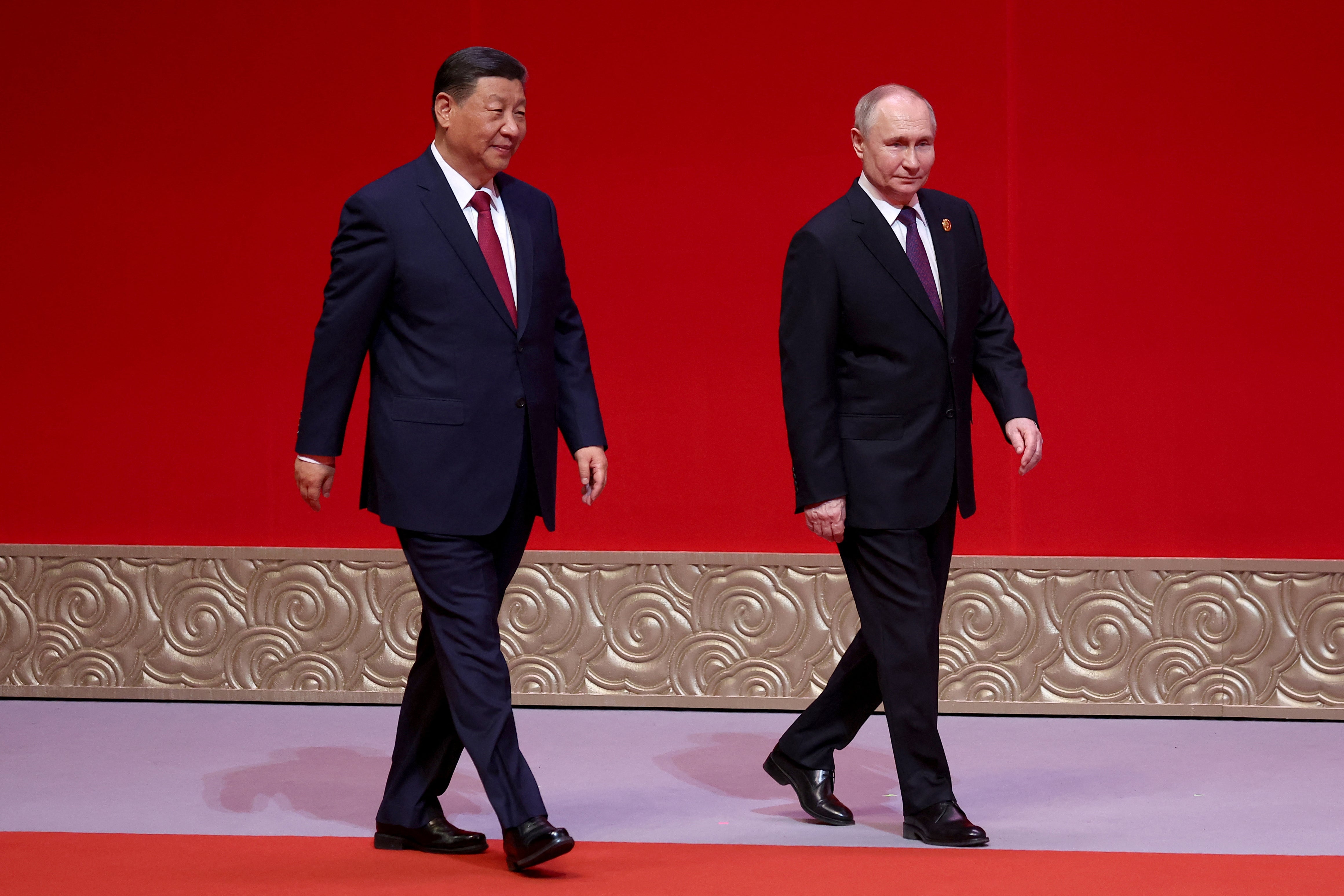What does Russia and China’s anti-American alliance mean in practice?
Besides avoiding the impact of Western sanctions over Ukraine, what is the benefit of the Putin-Xi partnership? John Rentoul looks at what the leaders agreed


Vladimir Putin, the Russian president, and Xi Jinping, his Chinese opposite number and host, agreed on Thursday to deepen their “strategic partnership” while accusing the United States of trying to “violate the strategic balance” in world affairs.
They issued a 7,000-word joint statement full of coded references to Russian and Chinese leadership of the world against attempts by the US to assert its hegemony over regions of the world that it ought to stay out of.
The document talks about “the deepening of the comprehensive partnership and strategic cooperation entering a new era”, and says that Russia and China “are determined to defend their legitimate rights and interests, resist any attempts to hinder the normal development of bilateral ties, interfere in the internal affairs of the two states, and limit the economic, technological or foreign policy potential of Russia and China”.
What are their grievances against the US?
Putin resents US support for Ukraine, and sees an equivalence between his claim on part of historic Russia and the Chinese claim to Taiwan. Xi is cautious about backing Putin too explicitly over Ukraine, but the joint statement says: “The Russian side positively assesses China’s objective and unbiased position on the Ukrainian issue.”
In return, Russia “reaffirms its commitment to the principle of ‘one China’, recognises that Taiwan is an integral part of China, opposes the independence of Taiwan in any form, and firmly supports the actions of the Chinese side to protect its own sovereignty and territorial integrity”.
Xi seems to be constantly testing the US and its allies over Taiwan but any attempt to claim the island by military force remains a hazardous undertaking. The trouble is, that is what most of the West thought about Putin’s ambition to occupy and assimilate the whole of Ukraine until he tried it.
Is this a resumption of the Cold War?
The joint Russian-Chinese statement says: “The US still thinks in terms of the Cold War and is guided by the logic of bloc confrontation … which creates a security threat for all countries in the region. The US must abandon this behaviour.”
This seems to be a classic case of projection, in that Putin and Xi assume that Joe Biden and Western leaders see the world as they do, divided into blocs locked in a zero-sum game. For example, he and Xi see Aukus, the defensive alliance between Australia, the UK and the US, as a reinforcement of the Western bloc and therefore a threat to them.
“Our cooperation in world affairs today serves as one of the main stabilising factors in the international arena,” said Putin in Beijing.
Doesn’t Rishi Sunak indulge in Cold War rhetoric?
In his speech on Monday, the prime minister said: “An axis of authoritarian states like Russia, Iran, North Korea, and China is working together to undermine us and our values.” This sounded a bit like George W Bush’s “axis of evil”, but that was just Iran, Iraq, and North Korea – it did not include countries with claims to superpower status such as Russia and China.
Rishi Sunak accused Putin of nuclear brinkmanship, and recalled the most dangerous phase of the Cold War: “Putin’s recklessness has taken us closer to a dangerous nuclear escalation than at any point since the Cuban missile crisis.”
However, most of Sunak’s speech was a warning of a range of threats to peace and stability, including the conflict between Israel and Hamas, while noting that some of the interests of Russia, China and Iran might overlap and reinforce each other.
What will Putin and Xi do next?
Putin’s next target is the 2024 Brics summit, a meeting of “non-aligned” countries that will be held in Russia in October. He wants to use the bloc, which consists of Brazil, Russia, India, China, South Africa, Iran, Egypt, Ethiopia and the United Arab Emirates, to counterbalance the dominance of Western financial institutions.
The buzzword at this summit will be “dedollarisation”, an attempt to reduce reliance on the US dollar in international trade and finance.






Join our commenting forum
Join thought-provoking conversations, follow other Independent readers and see their replies
Comments